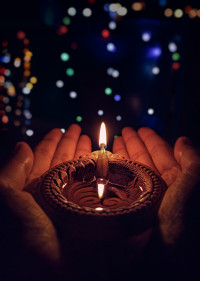As it is
What I learned from writing workshops
Participating in writing workshops made me aware of my many shortcomings as a writer.
Shuvangi Khadka
It started with dilly-dallying at a live session organised by Word Warriors, a spoken word poetry group. A few months later, I found myself sitting in one of their writing workshops. We were given prompts and we had to write about it without using clichés and overused metaphors. For me, this workshop model was fairly comfortable as we did not have to work vigorously perfecting a single poem but rather with short lines or paragraphs. I got out of the hangover of these workshops thinking a finished product is not the goal. Instead, it was finding unique ways to say my truth.
The writing bug had bitten me. I thought I could do it ferociously as long as I was staying true to myself. With this basic idea, I started applying to every writing workshop I came across.
Since childhood, I have loved devouring stories. I thought writing them in a workshop would be equally fun. But two weeks into an intensive fiction writing workshop, I was not only questioning my story but my very interest in writing.
I still remember entering the Zoom link on the first day of the writing workshop with my whole story idea mapped out. A friend with whom I had shared the story idea had assured me that the story plot of a family living a nomadic life sounded promising. But as the facilitator prodded me with one question after another about my idea, I sat blankly staring at my computer screen questioning my story’s logic.
Throughout the workshop, the facilitator reminded us that the trick was to never abandon our story no matter how tough the process got. I will never forget what he wrote in our last email exchange, “I know that the whole process can be disappointing at times because you get sick of the story and just want it to be over. But that's the thing about good art. It takes time and a lot of thinking and reworking.” But I will also not forget how I spent the last day of the workshop breaking down in my room.
Of course, it is difficult in the beginning. It is difficult to thicken your skin and to not take criticisms personally, and even if you do take them, to use it as fuel that pushes you to do better. To be honest, it hasn’t been any easier until now. But I often look back at that night as hitting rock bottom.
Still recovering from my experience of the last workshop, I was hesitant when I saw a call for aspiring writers to take part in a scriptwriting workshop. I enjoyed watching films but writing for one was new territory. I didn’t know about all the different types of writing genres but vaguely thought that writing stories and scripts were two different things.
One fine morning, an email informed me that I had been selected for the workshop. However, my excitement was short-lived as I started thinking about my shortcomings as a writer.
I changed my concept idea a total of three times. As I pitched my second last idea, the facilitators asked, “Do you think you’d be interested in watching this story?” Suddenly it dawned on me that writing about my truth was not enough. Now, I had to skillfully weave fact and fiction to write a story that stood aptly as a metaphor for life.
I dreaded going back the next day. But the fear of missing out on a class was even greater.
With every workshop I enrolled in, I was allowing myself to fail and to be vulnerable again and again. So much, that I reached a point where I started normalising failure and asking silly questions and having no answer.
I think part of my exasperation also came from how I approached learning in school. How the right answer was always put on a pedestal and how every exam was a test of our ultimate calibre. We couldn’t afford to fall short, let alone fail. The pressure to score perfect marks left little room to make mistakes and making mistakes was discouraged.
Technically, it was also easy not to fail in school. Because there are few instances if at all where you have to think out of the box. When I was in school, learning was mostly memorising and regurgitating. But with every new workshop, I was hurling myself into unfamiliar territory where I had to rethink, reimagine, reconnect and rebuild. Suddenly, there were no notes or guide books I could solely rely on. Suddenly, I was losing sleep trying to figure out my character and my imaginary world. In the process, I think I came to know about myself more than my character.
Failing is of course not limited to writing. Whenever we try anything new, we know there are equal if not greater chances of failure. But the idea of failure should never prevent us from doing it. As Sir Robinson famously said, “If you're not prepared to be wrong, you'll never come up with anything original.”
Also, who knows where we might end up after some years? We plan for our life thinking it will flow in a linear way. But life is never linear and circumstances are always changing. If we don’t create our lives symbiotically exploring our talents and circumstances, then we get accustomed to living within a box. Over time, our obsession with this linear narrative prevents us from thinking outside the box or realising possibilities beyond what we see.
I started my writing journey with poetry. But now, I have realised visuals help me envision my idea better. Workshops gave me space where my learnings were personalised. They provided me with hands-on writing experience, which of course was difficult. The journey taught me about my skills, passion and more importantly, about myself.
Workshops introduced me to mediums that I never considered to be suited for me. I know I am never going to write a song, but now I understand the journey of a song, word choices and the interplay between lyrics and music.
In all the workshops, even though there was a basic difference in their structure and form, the idea was the same. The desperation and effort were the same. It was always about observing, noting down ideas that appeal to you and questioning those very ideas. The first thing you write is most probably (definitely) not going to be a masterpiece. So, write freely, let your hands wander. Come back after a few days and see if the logic still holds true—that is, if you don’t cringe midway. And even if you do, know that writing is less about writing and more about editing and rewriting. Keep on working and finding that story that no one can say better than you.
However, I have to admit about the place of privilege that allows me to partake in these workshops. I am part of groups where social media posts about such workshops are circulated and I am a click away from applying to them. Not everyone has access to the internet, such groups and opportunities. So, for those who become privy to such knowledge, I think it is important to imbibe the lessons and pass them along.
Just the other day, somebody sent me their piece of writing for feedback. “Why do you want to write this?” I asked after I finished reading. I might never successfully complete a groundbreaking story or a script but I have definitely learnt to ask the right questions and I am going to forever take them with me.




 18.37°C Kathmandu
18.37°C Kathmandu










